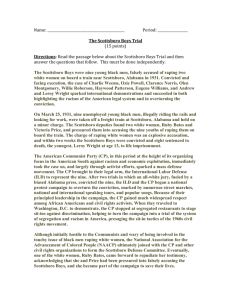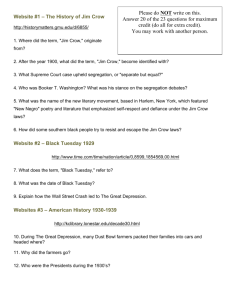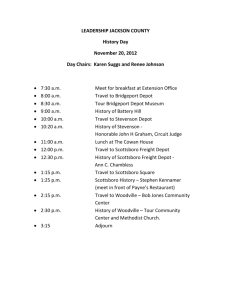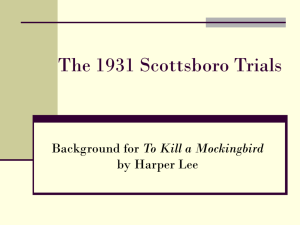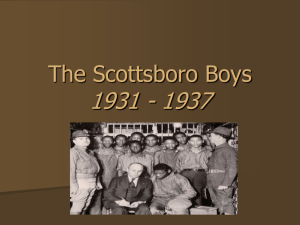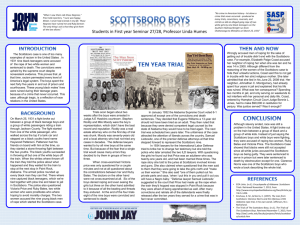essay
advertisement
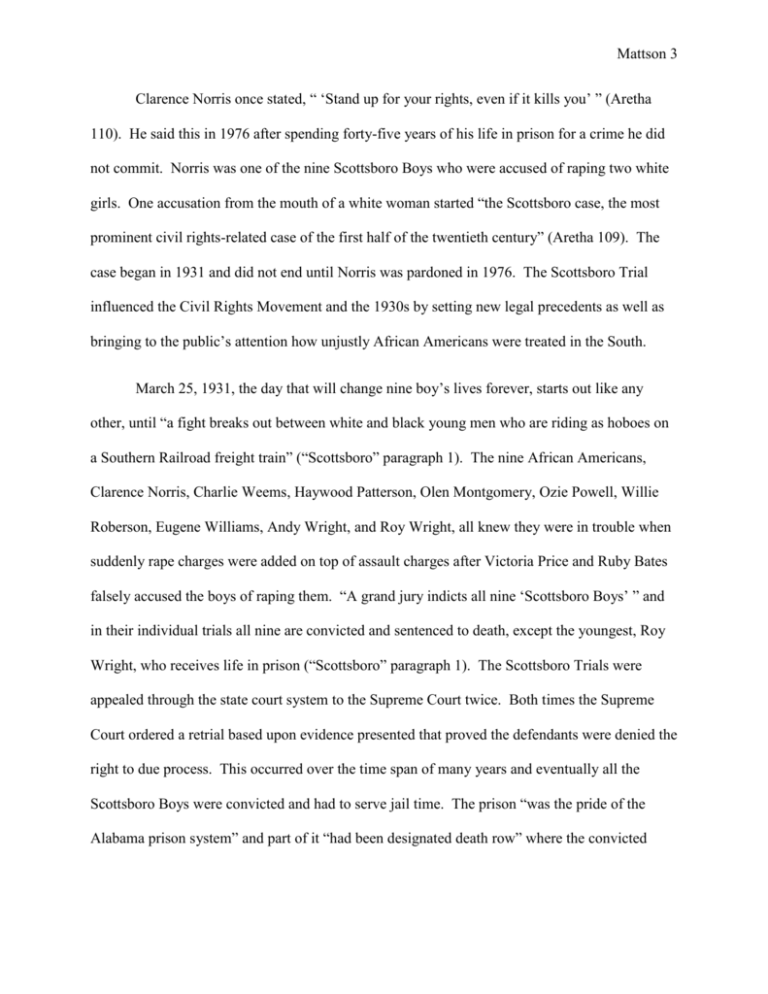
Mattson 3 Clarence Norris once stated, “ ‘Stand up for your rights, even if it kills you’ ” (Aretha 110). He said this in 1976 after spending forty-five years of his life in prison for a crime he did not commit. Norris was one of the nine Scottsboro Boys who were accused of raping two white girls. One accusation from the mouth of a white woman started “the Scottsboro case, the most prominent civil rights-related case of the first half of the twentieth century” (Aretha 109). The case began in 1931 and did not end until Norris was pardoned in 1976. The Scottsboro Trial influenced the Civil Rights Movement and the 1930s by setting new legal precedents as well as bringing to the public’s attention how unjustly African Americans were treated in the South. March 25, 1931, the day that will change nine boy’s lives forever, starts out like any other, until “a fight breaks out between white and black young men who are riding as hoboes on a Southern Railroad freight train” (“Scottsboro” paragraph 1). The nine African Americans, Clarence Norris, Charlie Weems, Haywood Patterson, Olen Montgomery, Ozie Powell, Willie Roberson, Eugene Williams, Andy Wright, and Roy Wright, all knew they were in trouble when suddenly rape charges were added on top of assault charges after Victoria Price and Ruby Bates falsely accused the boys of raping them. “A grand jury indicts all nine ‘Scottsboro Boys’ ” and in their individual trials all nine are convicted and sentenced to death, except the youngest, Roy Wright, who receives life in prison (“Scottsboro” paragraph 1). The Scottsboro Trials were appealed through the state court system to the Supreme Court twice. Both times the Supreme Court ordered a retrial based upon evidence presented that proved the defendants were denied the right to due process. This occurred over the time span of many years and eventually all the Scottsboro Boys were convicted and had to serve jail time. The prison “was the pride of the Alabama prison system” and part of it “had been designated death row” where the convicted Mattson 4 people had to stay (Goodman 95). Eight of the nine boys died in prison and only Clarence Norris was pardoned after spending most of his life in shackles. The Scottsboro Trial resulted from discrimination against blacks in the South. Governments in the south passed “ ‘black codes’ forbidding African Americans from basic citizen rights, such as the right to serve on juries, bear arms, rent and own land, drink alcohol, travel, and even learn to read” (Aretha 21). White Southerners hated African Americans so much they “considered blacks not just inferior to whites, but subhuman” (Aretha 21). The Great Depression also influenced the setting of the inciting incident and the trials politically. During the depression “millions were unemployed and thousands of men had left their homes and took to riding freight trains-called hoboing-in a desperate attempt to find work” (Aretha 9). Additionally, “the economic and social unrest occasioned by the Great Depression had provided a catalyst for the Communist Party to recruit disaffected workers,” and “communists perceived the Scottsboro Boys case as a vehicle for making inroads in the South” (Acker 4). The International Labor Defense (ILD), a communist organization, saw the Scottsboro Trial as a perfect venue to recruit African Americans in the South, so the organization provided legal counsel for the nine defendants. Consequently, the case “thus became infused with politics and social class, in addition to having sectional and racial dimensions” (Acker 4). Not only did the case become socially and politically significant, it illustrated the flaws in America’s justice system. It “was likewise a gross miscarriage of justice, despite the important precedents established by the U.S. Supreme Court” (Salter paragraph 12). Despite the injustice and discrimination in the South, the trials “united radicals, liberals, and moderates, as well as blacks and whites, in a common-if often contentious-alliance” (Salter paragraph 6). Many people who heard of the trials were inspired to help the nine defendants. This led to the Mattson 5 formation of two organizations, the American Scottsboro Committee (ASC) and the Scottsboro Defense Committee (SDC), in order to spread awareness of the Scottsboro Boys and to help them. The two committees organized protests and did their best to provide legal counsel apart from what the Communist Party provided, but nonetheless the nine were still found guilty. Even though the Scottsboro Trial ended tragically, the case set important legal precedents and greatly inspired the Civil Rights Movement. America shall always remember the Scottsboro trial because “the legal precedent established by the Supreme Court’s ruling in Powell v. Alabama, including the right to counsel, and Norris v. Alabama, prohibiting racial discrimination in jury selection, had solidified the cases’ place in American constitutional law” (Acker 198). Unfortunately, “the defendant’s lives were shattered by the long legal battle and the horrific conditions in the Alabama prison system” (Salter paragraph 12). For the majority of the Scottsboro Boys, they spent their teenage years in prison, and none of them ever quite recovered from the awful ordeal. Yet at the same time, “as a political and social movement and a cultural symbol, however, the Scottsboro case played an immeasurable part in undermining the structures of white supremacy in Alabama, the South, and throughout the nation” (Salter paragraph 1). The trial paved the way for other African Americans to stand up for their rights and start the Civil Rights Movement. Even though the nine boys endured hardships, pain, and discrimination, they made it possible for all people to be equal today. The Scottsboro trial illustrated the unfair and harsh treatment of African Americans in the South, and impacted modern society as well as the 1930s by establishing new legal standards and sparking the Civil Rights Movement. The incident began when two white women wrongly accused nine black boys of raping them. The court cases went to the Supreme Court two times and both times retrials were ordered because the original trials denied the nine their rights to due Mattson 6 process. The Scottsboro Trial was fueled by Southern hatred for African Americans, and became politically as well as socially significant. In a way the trials united Americans and the “cases speak volumes about America, about the country’s hopes and fears regarding race relations, class distinctions, regional mores and cultural traditions, political divides, and about the media and its representation of social and legal injustices” (Acker 208). The Scottsboro Trial made people aware of the injustice in the South and inspired others to start the Civil Rights Movement. Even though those nine boys died before they experienced equality and true freedom, they made it possible for people to be free of discrimination and segregation today. As Clarence Norris displayed, the fight for justice is always worthwhile.
